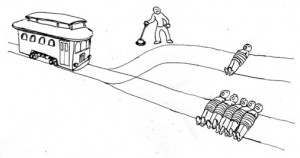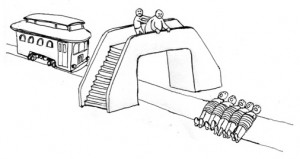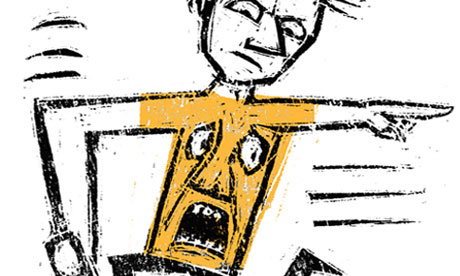Building community resilience means building group solidarity and the connection between this, faith organisations and charities is well known.
Elsewhere I’ve written about Resilience – drawing on Faith for Strength and how faith organisations including places of worship could play an increasingly active role in preparedness. How effective responses from faith organisations are, especially in times of crisis, emergency or disaster is clear: often they are the first on the ground lending assistance and giving aid. In some instances, this is not unproblematic, however, as my counter terrorism colleagues will appreciate for the provision of aid and welfare can also lead to creating a so called ‘enabling environment’ for extremist groups. Maybe this is part of the reason why some of those who really are doing good unconditionally and purely from a humanitarian point-of-view have such a hard time. Maybe it’s simply because some of them look a little different.
Meet Ravi Singh:
Dear Western World: Wherever SIKHS go we enrich Society! We are NOT ISIS! We are humanitarians and not murderers! pic.twitter.com/ZWo2E8Nar7
— ravinder singh (@RaviSinghKA) August 22, 2016
I absolutely DETEST those who impose conditional aid !! If you are a true humanitarian then you serve those in need unconditionally. — ravinder singh (@RaviSinghKA) September 4, 2016
Khalsa Aid has a long and outstanding track record of providing aid not only internationally, but also – yes you are hearing correctly – here in the UK.
“This is our community, these are our countrymen who are in dire need. I never knew the amount of devastation until we drove around to get to this place, we had to go several different routes and it’s amazing. The floods … the fields are like lakes. It’s unbelievable, how will they recover from this disaster? I think we all need to pull together; it’s very very important. ”
Ravi Singh, 2014 Disaster Charity Khalsa Aid Helps (UK) Flood Victims
“The impact of the floods in the north of England and Scotland has been enormous. Yet the disaster has brought together people who might never normally mix – from the armies of Sikh and Muslim volunteers to the individuals sending care parcels.”
The image in The Guardian article How the floods united the north from which the above quote is taken, shows volunteers from Khalsa Aid, giving out food to villagers in the flood-hit Lancashire village of Croston.
…. and in July 2016 they were handing out water to stranded motorists during a heatwave
So, why am I telling you all this? While absolutely brilliant, it simply should not come to this in the first place. Not today, in the 21st century and not in the UK, a first world country.
What is to be done?
Places of worship as centres for community resilience
Previously I’ve talked about Community Resilience Building Blocks – it all starts with prepared individuals which puts the onus on individuals and why that is tricky in Resilience and Preparedness Roadblocks: what stops us? While fundamentally ‘preparedness must begin individually, we also all know that real strength lies in social groups and solidarity; see Altruism and why it pays to be kind. As I mentioned earlier, one way of building community resilience is by drawing on Faith for Strength but it goes further, for places of worship can do a lot more than prayer and can become the nexus for community preparedness, responding to spiritual as well as bodily needs during times of real crisis.
This approach is already happening in North Yorkshire. Last year the North Yorkshire Resilience Forum created a successful evidence-based model approach which you can read more about in UK Community Resilience, a brilliant example of what works. It is my and other people’s sincere hope that in the future this kind of forward thinking, pro-active model will be supported and made available much more widely across many parts of the UK. It is also my hope that eventually such models will tackle and include food security issues.
Places of worship are important for another reason: security
The UK Government Home Office reacted swiftly in the aftermath of the horrific attacks in France on Jacques Hamel, the 85 year old priest at St.-Étienne-du-Rouvray.
Places of worship can now apply for funding for security measures to prevent hate crime: https://t.co/k5yqB1F2lm
— Home Office (@ukhomeoffice) July 26, 2016
While certainly a step in the right direction, the funding scheme is sadly limited to securing property, rather than people. Being rooted in (hate) crime prevention thinking, this is not surprising. What a brilliant opportunity this could be to broaden capacities and capabilities!
Places of worship, similar to schools, feature as areas of refuge and shelter-in-place on many an emergency planner’s community emergency plan. Why not also provide the wider resources needed to to communities so that they can respond in a major incident, emergency or disaster? I leave you with this question on this hottest September days since 1911 and also with a link to our newest information hub for places of worship evaq8.co.uk/PlacesOfWorship
Wishing you a safe and prepared rest of the week.
Monika
This post is also accessed by https://evaq8.co.uk/blog/community-resilience-aid-versus-preparedness/
Tweet thank you for sharing
@EVAQ8_news @Khalsa_Aid Thank you for the wonderful blog. We are always ready to serve our country.
— ravinder singh (@RaviSinghKA) September 13, 2016
@EVAQ8_news thanks, sharing this with @ArchdeaconLuke, Chair of the London Resilience Faith Sector Panel
— London Prepared (@LDN_prepared) September 13, 2016
For more EVAQ8 blog simply use the right hand navigation. For emergency kits and practical resources use the top navigation. For FREE resources head over to our Preparedness Hub and find out why we use humour. If you like this post, please share it to help raise awareness for Emergency and Disaster Preparedness. Thank you!
Find EVAQ8 on social media, like and follow us!


 MIT researchers Schwartz and colleagues who made these findings also think that the links between social interest, better mental resilience and reduced stress are in turn related to augmented self-confidence, an increased ability to be able to reframe one’s own experience and perceive greater meaning in life. Yet more evidence comes from the influential Hawaiian longitudinal study I mentioned in my earlier
MIT researchers Schwartz and colleagues who made these findings also think that the links between social interest, better mental resilience and reduced stress are in turn related to augmented self-confidence, an increased ability to be able to reframe one’s own experience and perceive greater meaning in life. Yet more evidence comes from the influential Hawaiian longitudinal study I mentioned in my earlier 

 The Guardian
The Guardian As a somewhat removed Swiss observer yet from ‘within so to speak as someone who lives here I am continually amazed at the British: the speed and boundless generosity with which communities have come together, pooling resources and sheer man (and woman and child!) power to help each another as well as to offer help across wider areas. In fact, generosity is and was so overwhelming that this morning the local newspaper
As a somewhat removed Swiss observer yet from ‘within so to speak as someone who lives here I am continually amazed at the British: the speed and boundless generosity with which communities have come together, pooling resources and sheer man (and woman and child!) power to help each another as well as to offer help across wider areas. In fact, generosity is and was so overwhelming that this morning the local newspaper 

